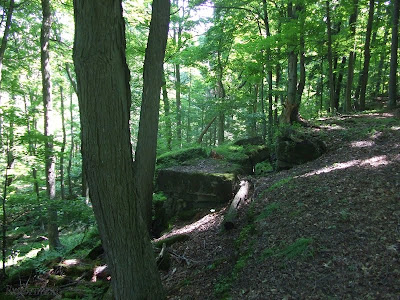Roughly 20 kilometers from my place (as the crow flies) is the Dundas Valley, which consists of 1200 hectares of Carolinian forests, fields, cold-water streams and geological formations that are home to an array of rare plants, birds and wildlife. Not to mention a 40 kilometre trail system. It’s part of the Niagara Escarpment which has been designated a World Biosphere Reserve by the United Nations Educational, Scientific and Cultural Organization (UNESCO).
I just really like the fact that I live in a major metropolitan area, yet a relatively short distance away is a sizable chunk of forest. Hiking there, around the valley and back constitutes not only good workout, but does something good for the soul as well.
And it always seems that it’s very quiet. Given what a great spot it is, I’m always surprised by how few people are out there. I’ll pass the odd family out for a stroll, some mountain bikers will zip past and I’ll encounter the occasional horse rider, but by and large, I can get away from the crowds. Kind of sad in a way that it’s not a more popular spot, and yet, I’m rather glad of that fact.
Merrick Orchard
The Hermitage ruins. It was built in 1855 and burned down in 1934. The remaining walls are held up with supports. I have to say though, not really what I envision a hermit living in. My own abode is considerably more humble. :-)
Some of the big rock formations, formed and deposited by glaciation.
One of the neat features of the valley is that glaciation scoured it to such a degree, that points of it are at a much lower elevation than the surface of Lake Ontario.
I suspect that to the original inhabitants of this area, the Valley must have been Eden. Mild temperatures, clear streams, plenty of natural shelter, game aplenty, lots of varieties of edible and medicinal plants.
I slept under some of these overhanging rocks one night years ago. The cool thing about it was imagining how many others throughout the centuries have as well.
The Niagara Escarpment on the other side of the Dundas Valley.
Part of the Bruce Trail system goes through the Dundas Valley. The trails that are maintained by the D.V.C.A. are very nicely groomed, but as you leave the valley, portions of the Trail reverts back to a rough, cobble strewn, ankle twisting, knee pounding brutalizer.
But as long as I stop to smell the flowers once in a while, it’s all good.
The Hermitage ruins. It was built in 1855 and burned down in 1934. The remaining walls are held up with supports. I have to say though, not really what I envision a hermit living in. My own abode is considerably more humble. :-)
Some of the big rock formations, formed and deposited by glaciation.
One of the neat features of the valley is that glaciation scoured it to such a degree, that points of it are at a much lower elevation than the surface of Lake Ontario.
I suspect that to the original inhabitants of this area, the Valley must have been Eden. Mild temperatures, clear streams, plenty of natural shelter, game aplenty, lots of varieties of edible and medicinal plants.
I slept under some of these overhanging rocks one night years ago. The cool thing about it was imagining how many others throughout the centuries have as well.
The Niagara Escarpment on the other side of the Dundas Valley.
Part of the Bruce Trail system goes through the Dundas Valley. The trails that are maintained by the D.V.C.A. are very nicely groomed, but as you leave the valley, portions of the Trail reverts back to a rough, cobble strewn, ankle twisting, knee pounding brutalizer.
But as long as I stop to smell the flowers once in a while, it’s all good.


































No comments:
Post a Comment